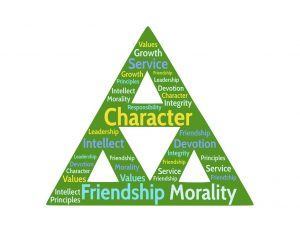Someone once said that our lives are the sum totals of the decisions we make. If this is true, and I think it is, then the next logical step for us should be to look for ways to learn how to make decisions. What is the right thing, and what is the wrong thing? Are there any metrics or standards by which we can judge what is good and bad, or expedient and inexpedient?
But our modern environments give us little in the way of help. We instinctively sense that society itself does not really have the answers. Having cut off the modern generations from the ancient moral code that has sustained Western social systems for centuries, the modern media offers little of substance to replace it. Or perhaps it does: a blind hedonism and a debilitating relativism, both capped with a corona of futility.
Modern man deserves better. Voices that have been suppressed for too long must be re-animated, dusted off, and pored over. One of those voices is Cicero’s On Duties. I have had the pleasure of translating it, and thought I might offer a few thoughts on why the book is worth reading. I will also state why I believe my version is superior to the others currently available.

On Duties is meant to be a practical guide to conduct. In broad terms, the volume is separated into three “books,” which discuss the following subjects:
- What is moral goodness, and how can it be attained?
- What is expediency, and how can we make use of it?
- How do we handle situations where moral goodness conflicts with expediency?
In specific terms, however, the book is a gold mine of practical guidance on a huge variety of topics. It’s one of those books you can open at random anywhere, and find actionable life advice in every sentence.
This is no airy disquisition on metaphysical labyrinths. It is firmly grounded in practicality. Just to point out a few topics (among a huge number), Cicero talks about:
- The laws of war
- How to choose a career
- Dealing with debts
- How to seek out a mentor
- The rules of commerce and commercial transactions
- Fraud
- Decorum
- Friendship
- Giving advice
- Real estate transactions
- Bravery
- Patriotism
- Handling ethical dilemmas
- Handling difficult people
- When to break one’s word
These are just a few of the dozens of topics discussed in the book. Most importantly, the book provides what is sorely lacking in today’s educational system: judgment. It tells us what is right, and it tells us what is wrong. There is no mealy-mouthed political correctness here. There is only the unvarnished advice of a man who has lived through much, and learned much.
Why Is The Book Important?
On Duties may be the most famous of Cicero’s many philosophical works. After the Gutenberg Bible, it was the first printed book published in Europe after the advent of the printing press. Broadly speaking, the book is about ethics and conduct. It seeks to offer guidance to men on how they should conduct themselves, and how they should go about making decisions.
It is not difficult to see why the book has enjoyed such influence. On Duties is a very practical guide to conduct, responsibilities, and choices. And isn’t ethics the highest sort of knowledge? It deals with how we should live our lives. It deals with which paths to take, which roads to follow, and which principles we should base our lives on.

We are never for a moment led into an arid wilderness of metaphysics or gratuitous speculations. Written at a time of great personal anguish for Cicero, the book has a sincerity that draws us in from the opening chapters.
The reader feels that Cicero is a man who has learned much from the battlefields of politics, the courtroom, and personal relations. We sense that this is a man who has managed to maintain his moral compass, and who now wishes to pass on some of that wisdom to us.
But perhaps what elevates On Duties to true greatness is its soaring and inspiring vision of man. This is no dry collection of Poor Richard-esque admonitions to do good and shun evil; this is a normative vision of human behavior that seeks to bring out the very best in us.
The work was written for his son Marcus, who was at the time studying in Athens.
Perhaps his grandest concept—one that lingers in the mind of the reader long after he has closed the cover of the book—is the idea of “greatness of spirit” (magnitudo animi). Cicero gives us an idea of what he means by greatness of spirit in I.20 when he tells us:
A strong and great soul is altogether distinguished by two features. One is the contempt for the external things of this world. The great soul is persuaded that no man ought to wonder at, hope for, or seek after anything except those things related to goodness and virtue, and that he should succumb to neither another man, nor a disturbance of the spirit, nor a trial of Fortune. The second feature is that, when you have molded your soul with this sort of attitude, as I said above, you perform great achievements of the highest utility which are extremely arduous, laborious, and full of danger to life and to many other things related to one’s livelihood.
With his concept of magnitudo animi, Cicero thus takes the discussion to a whole other level. What we have here is an inspiring vision of man, something that penetrates the reader’s heart like an arrow.
This, I believe, is the essential thread running through the book. It is this which makes On Duties such an enduring treasure. His sincere, earnest vision is timeless, and this is why we still read him today. Like any great orator (and was there anyone greater?) he aims far higher, for more universal and evocative principles. And he succeeds brilliantly.
When we put down On Duties, we feel imbued by this same greatness of spirit, and are prepared to renew the contest of life with optimism and fortitude.
How Is My Version Different From Others?
Despite the book’s popularity and influence, there has long been a need for a new, annotated translation of this classic.
What may have sufficed for one century or generation may be found wanting for twenty-first century readers. Hence this work. My translation departs from its predecessors in three important respects.
First, most of the existing English translations were done many years ago. Such efforts, which may have been adequate for their era, unavoidably begin to show their age after a certain point. The modern reader wants something accurate and readable, yet which at the same time preserves the classic patina of the original.
Unfortunately, some of the existing translations confront the reader with such a hopeless mass of semi-colons, stacked clauses, archaic nineteenth century diction, and knotted sentences that reading them is a chore rather than a pleasure. Cicero was an eloquent stylist, always conscious of his audience, and this type of translation does injustice to the original.
We must remember that Cicero was always the lawyer, arguing his points with force, conviction, and clarity. When he repeats himself, he does so deliberately. When he castigates political opponents, he does so for a reason. When he tells us multiple times that nothing can be expedient which is not also morally good, he does so deliberately. These are not accidents.

He knows that juries, like book readers, need emotional connection, summary, and repetition. Some translators, because they are not trial attorneys by profession, entirely miss this point.
But those of us who have tried cases before juries—and I am not aware of any other translator of On Duties who was also a trial lawyer—see the method and purpose in Cicero’s rhetoric. But the translator must not veer to the other extreme: while Cicero did not write like a Victorian or Edwardian novelist, he did not sound like Hemingway, either.
So when we update On Duties for the modern era, we must go about the task very carefully, keeping these points in mind.
As I see it, the most important duty of the translator is to find that balance between fidelity to the original text and the stylistic rhythms of modern written English. Every language beats with its own heart. What may make perfect sense in a Latin sentence may be anything but clear in a literal English rendering.
In such situations, we must use the grammatical tools available to give Cicero his proper voice. Labyrinthine sentences may occasionally need to be broken into parts. Latin pronouns may need to be specifically clarified. Cicero’s love of the passive voice must sometimes be tempered with use of the active voice. We must know when Cicero really means “I” when he writes “we.” He can be evasive and slithery one moment, and brutally frank at another.
At times, his meaning resides in his qualifications and obliquities. And so on. Modern, lucid diction should be the translator’s default position, unless the context clearly suggests otherwise.

Secondly, it became apparent that a much better way of organizing the material was needed. On Duties deals with a great many topics and terms. Like all classical writings, the text long ago was separated into “books,” chapters, and subsections by scribes and editors; but Cicero never gave his chapters descriptive headings or names.
Locating a topic or term easily can then present a problem. Some editors have made use of marginal notes, but these tend to clutter the text, and still require the reader to thumb through too many pages. I have thus opted to create a descriptive table of contents at the beginning of the book which lists the main topics of each chapter (indicated by Roman numerals).
This feature, together with the index, solves the problem of locating subjects and topics efficiently. This is a book that is meant to be used, studied, and discussed.
Thirdly, the modern reader requires descriptive footnotes that presume no previous knowledge of Roman history. A translator can no longer take it for granted that a reader in 2016 will recognize, for example, the names Regulus or Titus Manlius Torquatus.
As stated above, most versions of On Duties were produced for audiences early in the previous century who were assumed to have some knowledge of Roman history or Latin, and likely both. This translation presupposes no such knowledge.
It is accessible to all, not just to students of the classics. Several hundred footnotes explain every historical name and reference, as well as obscure terms, linguistic nuances, places, topics, or textual issues. Commentary sections at the end of each book highlight important issues raised in the text.
What On Duties gives us is a frame of reference for making decisions. We have at last a guide that presents us with a positive view of man that can help us take positive, specific action.
Modern men lack character. I try to not be a total introvert and socialize, but it is so hard to find decent, honorable, and reliable men to socialize with. For example, I coach a softball team for law clerks and the male players are terrible – the girls are more reliable. It’s only 12 games in a summer and they will miss games to watch fucking sportsball playoffs or any other excuse in the book. When they do show up, it is 10 minutes before game time even though I am out there with the gear an hour early to warm up and practice.
I find your lack of bacon … disturbing. /vadervoice
(Bacon is above mere pig protein, tasty though it is.)
Good article but for the real GOOD decision-making I’d say look ye to the WORD OF GOD (King James Version Holy Bible [KJV]): http://www.jesus-is-savior.com/Bible/1611_authorized_king_james.htm
Amen!
~ Sincerely,
Bro. Jed
Nice, I have been trying to get into THE classics lately. You come to realize that the SJW’s really are the barbarians at the gate. The stupid and lazy demean our culture because they lack the discipline to earn it.
These days, it is so superior to be inferior.
Big congratulations are in order, Quintus. This is a book that deserves my time and attention. I am behind on several other books on my list, not to mention working 10+ hour days at the moment, but this is definitely on my list. Hopefully there will be a few more articles with some nuggets of wisdom from On Duties in the future.
Thanks much, NuJac. Much appreciated. I am certain that you’ll find my edition to be the best, most complete, and most explanatory available. Beyond that, it’s a book that you can dip into for years, and always find something new to think about and act on. These kinds of books make us all better men.
It would be nice to have a list of books that have been explored and mentioned on RoK.
I have listened to you QC on your podcasts and with Matt Forney.
You are one smart dude, Sir. Your voice is incredibly soothing.
Oxford World’s Classics has a translation titled On Obligations:
https://www.amazon.com/Obligations-Officiis-Oxford-Worlds-Classics/dp/0199540713/
Articles like this belie the notion that Return of Kings attracts creepy misogynists who only care about getting laid. Men who have become alienated from the degenerate women and other walking defects of modernity recognize that patriarchy has roots in the wisdom tradition of our ancestors, and experience shows us over and over again that our forefathers got a lot of important things right the first time around. By contrast feminism and its associated social-justice ideology have no roots at all.
Or for the impecunious there’s the Loeb Classics version with facing-page translation, gratis at Project Gutenberg: http://www.gutenberg.org/files/47001/47001-h/47001-h.htm
I’m starting to look at philosophy as a craft and a form of wealth. A time consuming and exhausting craft, but worth the sacrifice in wealth. One regret is that I didn’t pay attention, applying myself to absorb as much as I could from classical western sources when I was in my teens.
That’s the nature of imprudence in wealth, to want what you can’t have and to have what you can’t possibly use. I couldn’t have it when I was younger because I was ignorant of its existence, and I couldn’t use it for myself then because I don’t think I started legitimately using my mind until I was in my 20’s.
I’m grateful for people like you QC. Very few realize the importance of this, and how Cicero (especially through Petrarch) changed Western civilization forever. And unlike debased modern minds who through organized efforts of manipulation have changed the west, Cicero changed it for the better. I haven’t read your translation of Stoic Paradoxes, but as soon as I’m done with Seneca’s Letters and another philosophy book I’ve started, I would really like to get a copy of your translation of On Duties. Thank you.
I’m trying to organize a meetup this weekend in NYC. Is anyone interested? Reply down if that is the case. I’ll show my burner later.
I’m looking forward to reading your work and translation Quintus. Thanks for bringing this beneficial tome to the fore.
I thought we were all rape advocates?
Congratulations on translating Cicero for a modern audience – an idea who’s time has well and truly come!
Cicero is a writer I reach for on so many occasions as his wisdom resonates for all time, and is especially needed in today’s debased and swinish world. Yes his philosophy is first rate, and not just for armchair philosophers…. the man was one of the leading politicians of his time (a time of utmost turbulence – the rise of Octavian and the transition of Rome from Republic to Empire), had first hand experience of governing a huge province, and was finally assassinated for unwisely bating the great Mark Antony.
A fine collection of his letters have survived to our time, to many of the great figures of the time (including Octavian), but especially to his friend and Hellenophile Atticus. Truly worth reading for insight into the man and his life and times…
Known best for his oratory, his advice on public speaking is still entirely valid today. I’ve applied all his ideas on this front and they work just fine with modern audiences.
As noted in the article, Cicero was once required reading for any man aspiring to better himself. It is truly tragic that he and other classical authors have fallen out of ‘fashion’ and, I think, intimately connected to the rise of feministing SJWs and other far-left retards. A classical education would have protected today’s weak minds from the brainwashing they have received… anyone reading Aristotle’s prior and posterior analytics, for example, would be incapable of being deceived by that lefty shite…
So thanks again Quintus Curtius, for helping to revive the *true* ‘red pill’ tradition… the one that has been a three thousand year dialogue between thinking Men across the ages.
Ethics and morals are not the same. Cicero spoke about personal ethics WITHIN a system of morals.
Also: personal ethics are NOT “modern relativism”…it is a hard and stony path with 1000 traps and 1000 dilemmas underway…and daily.
To follow morals of an era/society/religion is easier…but, being ethical makes one Just.
🙂
Thanks for putting this together. I can’t imagine what an undertaking this must have been. I’ll be adding it to the reading list for summer once I finish a few other books.
Looking forward to reading this Quintus. Also I agree with your claim that current translations are out of date. After searching through Amazon your translation was the first result and other versions did not appear to be adequate.
That’s super awesome, very impressive feat!
What a mission.
Have always thought the Cicero that sits on my shelf is incomplete and that there was something missing.
Congratulations Sir Quintis.
fuck off!
We spend years in school learning nonsense when all the knowledge we ever needed to live prosperous fulfilling lives has been written in the classics. I have only really started learning things when I discarded my “classical liberal” education and started reading the works of wise men. It’s not only philosophy, it’s mathematics too, everything you need to know about numbers and finances can be found in Fibonacci’s “Liber Abaci” which he wrote in 1202. You can see how far wrong the world of finance has gone when you compare his classic calculations to figure out interest on investments and loans to the methods used by financial institutions today. They blatantly rip their customers off.
I remember a quote that I thought was attributed to Cicero, i.e.
“There is not a man alive who when it comes to his wife, wishes he had never laid eyes on her”
Can anyone here tell me if Cicero actually said this, and if not who did?